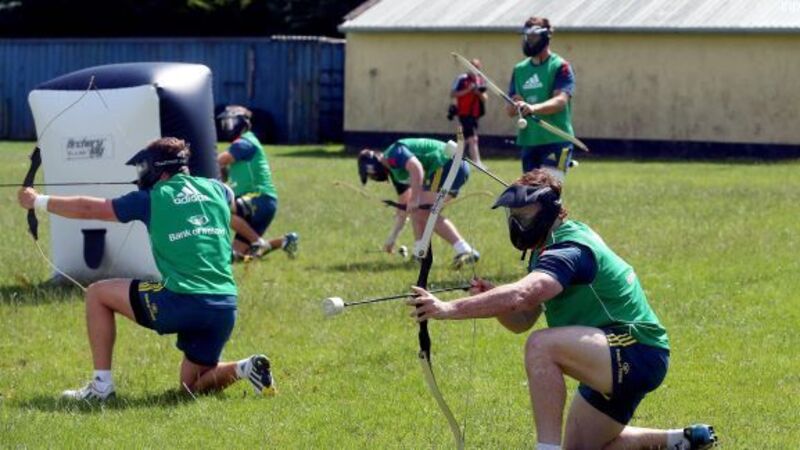Break barriers, build spirit

When you’re taking team-building advice from Dutch footballers, the good news is you’ve hit rock bottom and the only way is up.
The Oranje practically have the patent on individual tantrums which derail progress at major tournaments, but that didn’t stop Johnny Heitinga from patronising England’s lack of team ethic at the 2010 World Cup.
“England went out so soon. When you see all the players in their squad you’ve got maybe the best team in the world,” offered Heitinga, but he hadn’t yet been passed the sour milk.
“But if you want to win a title the most important thing is you have to be a team, work for the team and fight for each other. You have to put your ego away and play as a team.”
For sportspeople outside the elite realm, team-building usually means a pub, some forfeits, possible nudity and minimum dignity. But such frolics are generally frowned upon for professional athletes, so sporting organisations have instead drawn inspiration from the business world, according to Cork-based sports psychologist Canice Kennedy.
“In many ways, it’s copied from business. Most of the literature on it is based around cohesion — people working better together as a unit. Even the terms used, the importance of goals, processes, relationships — it’s all business transferred to sport. The traditional form of team-building was going to the pub, and it was bloody effective. Relationships were made, trust was built and people spent time together. But in the modern era, it would no longer be seen as appropriate for full-time, professional athletes to do that. So the more innovative organisations have started to look at different methods of team-building.”
Both Munster and Ulster split their players into groups at short notice this week, making them traverse their respective provinces without food, accommodation or transport. The players used social media and the goodwill of local fans and businesses to get by, so everyone wins — the team is ‘bonded’ and it’s marketing gold-dust.
The concept of team-building began with Elton Mayo’s Hawthorne Experiments in Chicago factories in the 1920s and 30s.
Among the findings were that a positive work culture and good relationships between workers and supervisors helped productivity soar, leading in the decades that followed to the emergence of specific team-building retreats.
Professionalism, the decline of drinking cultures and increased requirements for sports stars to be finely-tuned athletes meant that the sports world eventually caught up too around the 1990s.
Kennedy says team-building usually has one of two primary focuses, and sometimes both: building relationships in double-quick time, and testing the strength of players’ character.
“The turnover of players every season is huge in professional teams, and there isn’t time for the natural relationship-building process to take place, it has to be fast-tracked. It’s easier to put your body on the line for someone you like and respect. Teams are increasingly multi-cultural, so you have lots of languages, races and religions within a dressing room. The process of team-building is very effective in that scenario. If nothing else, potential problems like personality clashes can be identified quickly. For a new coach, it’s a good way of finding out how guys react when put in vulnerable positions.”
The latter is exactly what happened to the Irish women’s hockey team when they visited Cork last month. Having exercised their minds with some group problem-solving, they thought they were in for a leisurely hike in the sunshine when they arrived at Ballincollig’s Regional Park. Defender Audrey O’Flynn takes up the story.
“We arrived and started walking, and there was one guy with us. Next thing you know there’s a load of guys from the Irish Defence Forces screaming at us to get our faces to the floor and do pushups. There was definitely dog piss under my face too! Before long we were blindfolded and forming a human chain, walking through a river. You had to guide the person behind you, and there were messages coming down the chain. They were making loads of noise so you had to be really clear. We were ducking under branches and jumping over holes, although the coaches told us afterwards these ‘obstacles’ weren’t actually there!
“It was a gruelling three hours on a roasting hot day; we also had to race around the park carrying 70kg dummies on stretchers. It was character-building stuff.”
There is a risk that coaches can go too far, such as when South African rugby was widely panned for making players endure the inhumane Kamp Staaldraad prior to the 2003 World Cup.
A litany of alleged incidents included players huddling naked in a foxpit to sing their national anthem over recordings of anthems from rival countries, while being doused in freezing water.
A balance can be struck to good effect, however. Kennedy says reports from the British army on the weakness of character in some players following a team-building retreat helped Clive Woodward confirm his own suspicions and make the decision to drop them prior to England’s ultimately successful 2003 Rugby World Cup campaign.
Kennedy also tells of an unnamed Premier League club who pencilled in a pre-season jaunt to the Scottish Highlands, to see how some imports from sunnier climes might handle adverse weather conditions months ahead of the British winter.
Ultimately, like nutrition, sports psychology or strength and conditioning, team-building is another element of the off-pitch hoopla that some will embrace and others will endure. O’Flynn sees two main benefits among her Irish hockey comrades.
“There’s things you take with a pinch of salt but you can really apply others, especially the communication. We’ve made a big effort in training not to tolerate ‘garbage talk’, cutting out irrelevant or overly-complex chat. When we speak now, it’s relevant and important. That day in Ballincollig, they tried to break us: they told us so. Knowing we’re capable of pushing ourselves further than we thought is good for us.”














